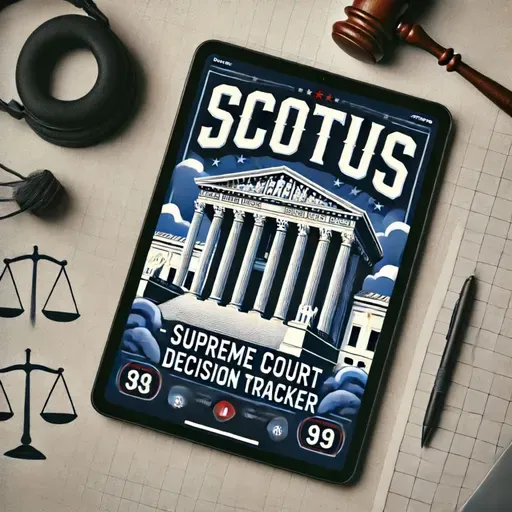
03 September 2025
"Supreme Court Grapples with Tariffs, Voting Rights, and More: A Comprehensive Update"
Supreme Court Tracker - SCOTUS News
About
Supreme Court watchers have seen a busy few days. The Trump administration is seeking an expedited Supreme Court ruling on the legality of new tariffs it imposed under the International Emergency Economic Powers Act, after a major appellate court ruling went against the administration’s orders. These tariffs—especially the ones applied to Canadian, Mexican, and Chinese goods—could remain in effect for at least another month while the administration gears up for its Supreme Court appeal, and if the justices take the case, it could lead to a significant decision on presidential powers to regulate international trade and emergencies. Importers and trade partners are anxious about potential retroactive refunds, depending on how the Supreme Court ultimately rules.
Meanwhile, voting rights are squarely in the spotlight following a petition that asks the Supreme Court to decide whether private citizens can still sue under Section 2 of the Voting Rights Act. The urgency is high after an appeals court ruled only the federal government can enforce this law, directly contradicting decades of practice where private individuals were the main enforcers against racially discriminatory voting laws. Native American voters and advocacy groups want the Supreme Court to reaffirm the rights of private plaintiffs, and the justices have temporarily paused the ruling that limits private enforcement while they consider taking the case.
In grant dispute news, the Supreme Court recently made an impact by signaling that challenges to federal grant terminations—such as those brought against the National Institutes of Health—are fundamentally contract disputes. This means such cases should be heard in the Court of Federal Claims, not federal district courts. The decision could have broad ramifications for disputes over billions of dollars in federal funding, not just in biomedical research but also in areas like energy and education.
Immigration is also front and center, with the Trump administration pressing the Supreme Court to review several policies, including legal questions over asylum seekers at the southern border and the president’s recent order ending birthright citizenship. Court filings highlight the administration’s desire to settle these contentious issues during the coming term.
Data privacy and administrative access are another flashpoint. The Supreme Court recently lifted lower court orders that blocked government access to sensitive Social Security Administration data, siding with the administration and allowing the contested access even as dissenters warned about serious privacy risks for millions of Americans. Separately, the Court lifted orders safeguarding the lawful status of about half a million noncitizen residents, further solidifying the administration’s firm stance on immigration enforcement before a full legal review.
Notably, Justice Amy Coney Barrett made headlines with new comments defending the decision overturning Roe v. Wade and offering insights into current Supreme Court dynamics, drawing additional attention to the Court’s evolving conservative approach.
Finally, there’s an unusual property case: an Alaska man whose plane was seized over a six-pack of beer has asked the Supreme Court to review the forfeiture, tapping into ongoing debates about civil asset seizures and due process.
Thanks for tuning in, and don’t forget to subscribe. This has been a Quiet Please production, for more check out quiet please dot ai.
For more http://www.quietplease.ai
Get the best deals https://amzn.to/3ODvOta
Meanwhile, voting rights are squarely in the spotlight following a petition that asks the Supreme Court to decide whether private citizens can still sue under Section 2 of the Voting Rights Act. The urgency is high after an appeals court ruled only the federal government can enforce this law, directly contradicting decades of practice where private individuals were the main enforcers against racially discriminatory voting laws. Native American voters and advocacy groups want the Supreme Court to reaffirm the rights of private plaintiffs, and the justices have temporarily paused the ruling that limits private enforcement while they consider taking the case.
In grant dispute news, the Supreme Court recently made an impact by signaling that challenges to federal grant terminations—such as those brought against the National Institutes of Health—are fundamentally contract disputes. This means such cases should be heard in the Court of Federal Claims, not federal district courts. The decision could have broad ramifications for disputes over billions of dollars in federal funding, not just in biomedical research but also in areas like energy and education.
Immigration is also front and center, with the Trump administration pressing the Supreme Court to review several policies, including legal questions over asylum seekers at the southern border and the president’s recent order ending birthright citizenship. Court filings highlight the administration’s desire to settle these contentious issues during the coming term.
Data privacy and administrative access are another flashpoint. The Supreme Court recently lifted lower court orders that blocked government access to sensitive Social Security Administration data, siding with the administration and allowing the contested access even as dissenters warned about serious privacy risks for millions of Americans. Separately, the Court lifted orders safeguarding the lawful status of about half a million noncitizen residents, further solidifying the administration’s firm stance on immigration enforcement before a full legal review.
Notably, Justice Amy Coney Barrett made headlines with new comments defending the decision overturning Roe v. Wade and offering insights into current Supreme Court dynamics, drawing additional attention to the Court’s evolving conservative approach.
Finally, there’s an unusual property case: an Alaska man whose plane was seized over a six-pack of beer has asked the Supreme Court to review the forfeiture, tapping into ongoing debates about civil asset seizures and due process.
Thanks for tuning in, and don’t forget to subscribe. This has been a Quiet Please production, for more check out quiet please dot ai.
For more http://www.quietplease.ai
Get the best deals https://amzn.to/3ODvOta